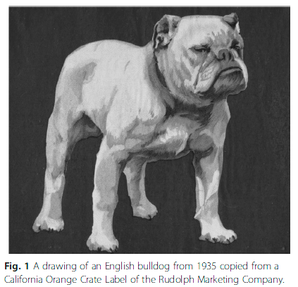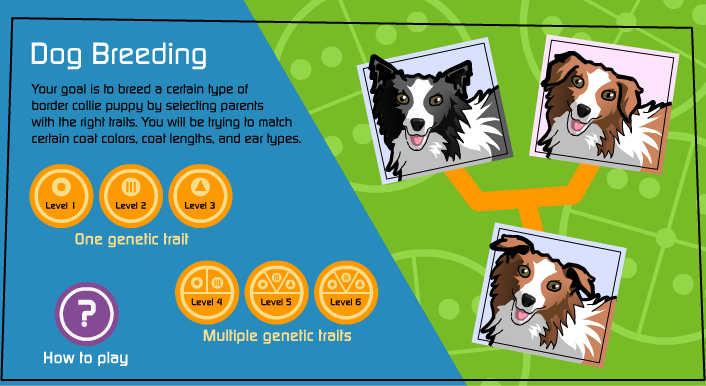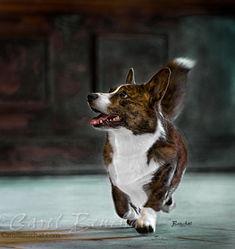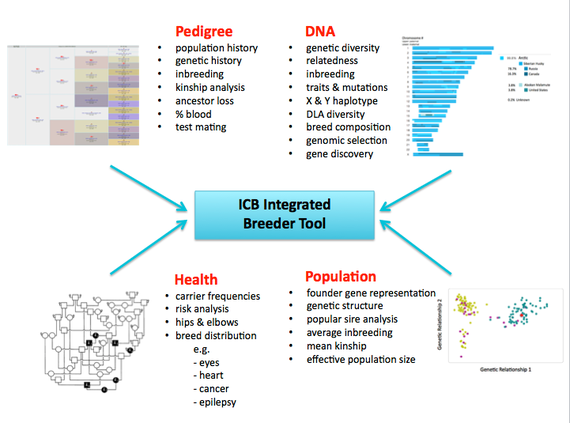| The researchers found very low genetic diversity not only in dogs intended for breeding, but also in dogs from the "pet" population, and the show and pet populations were very similar. Low genetic diversity is associated in mammals with a long list of health disorders as well as inadequate function of the immune system. Indeed, Bulldogs suffer from an exceptionally long list of genetic disorders and problems related to brachycephaly, and they have a short lifespan as well. The study also showed that large blocks of genes on the chromosomes were homozygous. Traits cannot be improved and health problems reduced unless there is genetic diversity in the breed; without it, there is nothing to select for. The long runs of homozygosity (ROH) found in the Bulldog suggest that reducing health issues through selective breeding could be extremely difficult if not impossible. |
This study is not an attack on the Bulldog as a breed or on Bulldog breeders. It is one of a number of studies that have documented the genetic impoverishment in purebred dog breeds that has resulted from a small number of original founders, bottlenecks, and strong selection.
Reputable, responsible Bulldog breeders are making diligent efforts to improve the health of the dogs they breed by careful selection of breeding stock and by health testing. But the data from this study indicate that even the most diligent efforts of breeders are likely to be inadequate, simply because there is not sufficient genetic diversity left in the breed.
Neil deGrasse Tyson has pointed out that the problem with denying the evidence of science is that science is true whether you believe it or not. Attacking the messenger, or trying to discredit the study or impune the reputations of the researchers, is really quite pointless. Of course, there are bulldogs out there are are relatively healthy and live long, happy lives. But this study is documenting the ill health not of the individual dogs, but of the gene pool of the breed. Breeders cannot use selection to solve health problems if there is no variation in the alleles in the gene pool to select from.
This is a good study, published in an excellent, peer-reviewed journal. In fact it held few surprises for those that understand genetics and know the history of the purebred dog.
This is definitely bad news for Bulldog breeders. But instead of wasting time and energy looking for ways to make it go away, embrace the fact that there is a problem and that the solution is, and must be, in the hands of the breeders.
Serious, reputable breeders and those that love the breed should use the information in this study to motivate a commitment to improve the health of the gene pool of the breed. Contact Dr Pedersen at UC Davis and ask for his help in coming up with effective and efficient breeding plans that will improve the health of the breed. Learn about population genetics, the scientific field that provides the tools used in this study to evaluate the genetic health of animal populations, so that you can implement an appropriate breeding plan and manage the health of the gene pool in the future.
Many breeds are in similar genetic straits, but few are acting to address their issues. Bulldog lovers can turn bad news into an opportunity. You can set an example. Gather yourselves together and make a commitment to restore the health of the gene pool of this breed. Only breeders can solve this problem.
ICB's online courses
*******************
Coming up NEXT -
Basic Population Genetics for Dog Breeders
Class starts 25 July 2016
***************************************
Visit our Facebook Groups
ICB Institute of Canine Biology
...the latest canine news and research
ICB Breeding for the Future
...the science of dog breeding






